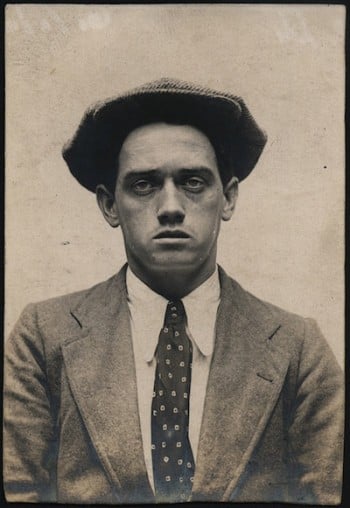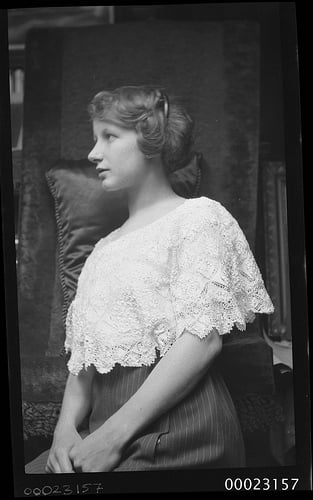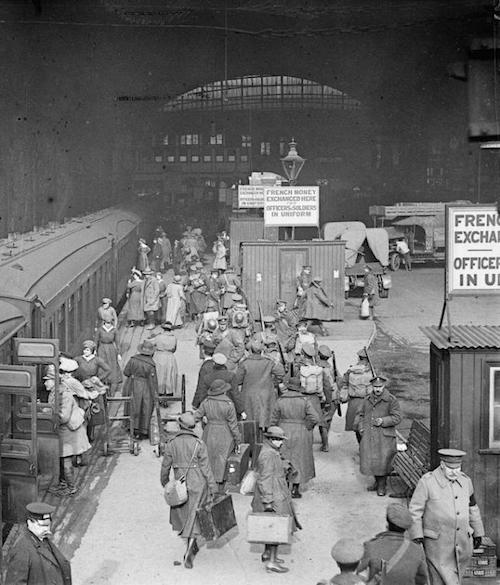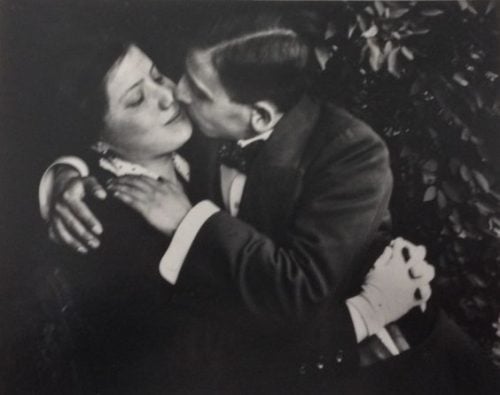A Rogue By Compulsion (7)
By:
May 13, 2016

Victor Bridges’ 1915 hunted-man adventure, A Rogue by Compulsion: An Affair of the Secret Service, was one of the prolific British crime and fantasy writer’s first efforts. It was adapted, that same year, by director Harold M. Shaw as the silent thriller Mr. Lyndon at Liberty — the title under which the book was subsequently reissued. HiLoBooks is pleased to serialize A Rogue by Compulsion — in 25 chapters — here at HILOBROW.
One would hardly expect an escaped murderer to complain of being dull — especially when the whole country is still ringing with the story of his disappearance. Yet I must confess that, when I had once got used to the strangeness of my position, the next two weeks dragged intolerably.
I was accustomed to confinement, but in the prison at all events I had had plenty of hard work and exercise, while here, cooped up entirely in one room, I was able to do nothing but pace restlessly up and down most of the day like a caged bear. I had finished my lists and drawings for McMurtrie, and my only resources were two or three sensational novels which Sonia brought me back one day after a visit to Plymouth. I cannot say I found them very entertaining. I had been rather too deeply into life in that line myself to have much use for the second-hand imaginings of other people.
Of the doctor and Savaroff I saw comparatively little. Both of them were away from the house a good deal of the time, often returning in the car late at night, and then sitting up talking till some unholy hour in the morning. I used to lie awake in bed, and listen to the dull rumble of their voices in the room below.
That there was something mysterious going on which I knew nothing about I became more convinced every day, but what it could be I was unable to guess. Once or twice I tried to sound Sonia on the matter, but although she would talk freely about my own affairs, on any point connected with herself or the curious household to which she belonged she maintained an obstinate silence.
The girl puzzled me strangely. At times it almost seemed as though she were being forced against her will to take part in some business that she thoroughly disliked; but then the obvious way in which the two men trusted her scarcely bore out this idea. She showed no particular affection for her father, and it was plain that she detested McMurtrie, yet there was evidently some bond between them strong enough to keep all three together.
To me she behaved from the first with a sort of sullen friendliness. She would come and sit in my room, and with her chin resting on her hand and her big dark eyes fixed on mine, she would ask me questions about myself or listen to the stories I told her of the prison. Once, when I had been describing some peculiarly mean little persecution which one of the warders (who objected on principle to what he called “gen’lemen lags”) had amused himself by practising on me, she had jumped up and with a quick, almost savage gesture, laid her hand on my arm.

“Never mind,” she said; “it’s over now, and you shall make them pay for what they have done to you. We can promise you that at least,” and she laughed with a curious bitterness I failed to understand.
Of the mysterious Mr. Hoffman, who had turned up at the house on the second day after my arrival, I saw or heard nothing more. I asked Sonia about him one day, but she only replied curtly that he was a business friend of the doctor’s, and with this meagre information I had to remain content.
The point that I felt perhaps most inquisitive about was whom McMurtrie could have mistaken me for when I had crawled in through the kitchen window. I had a distinct recollection of his having mentioned some name just before I had collapsed, but it had gone out of my head and for the life of me I couldn’t recall it. You know the maddening way a name will hang about the tip of one’s tongue, just avoiding every effort at recapture.
Apart from my talks with Sonia, my chief entertainment was reading the Daily Mail. Not a day passed but some one seemed to discover a fresh clue to my hiding-place. I was seen and recognized at Manchester, Yarmouth, London, and Edinburgh; while one gentleman wrote to inform the editor he had trustworthy information I was actually in St. Petersburg, having been engaged by the Russian Government to effect certain improvements in their torpedo service. All this was quite pleasing, for, in addition to showing me that the police were still utterly at sea as to my whereabouts, I knew that each fresh report would help to keep George in an acute state of nervous tension.
Just as my imprisonment was becoming almost unbearably irksome, the end arrived with an unexpected abruptness. I was sitting at the window one morning smoking an after-breakfast pipe — a pipe which Sonia had brought me back from Plymouth at the same time as the books — when I heard a loud ring at the front door-bell, followed by a couple of sharp knocks. Despite my three years’ absence from worldly affairs, I recognized the unmistakable touch of a telegraph-boy.
Since it was hardly likely that the wire was for me, I continued to smoke with undisturbed serenity. Perhaps ten minutes passed, and I was just wondering whether the message had anything to do with the arrangements which McMurtrie was making on my behalf, when a door slammed and I heard someone coming up the stairs. I knew from the sound that it was the doctor himself.
He entered the room, and looked round with his usual suave smile. To all outward appearance he was as composed as ever, but I had a curious presentiment that something unexpected had happened. However, I thought it best to show no sign of any such impression.
“Good-morning,” I said, knocking out my pipe and stuffing it away in my pocket — or rather Savaroff’s pocket. “A grand day, isn’t it!”
“Beautiful,” he answered genially — “quite beautiful.” Then he walked across and sat down on the end of the bed. “As a matter of fact, I came up to see whether you felt like taking advantage of it.”
“Do you mean that it’s safe for me to go out?” I asked with some eagerness.
He shrugged his shoulders. “It’s as safe as it ever will be; but I meant rather more than that.”
There was a pause.
“Yes?” I said encouragingly.
“I meant that our preparations are going on so well, that as far as I can see there is nothing to be gained by keeping you here any longer. I have just had a wire to say that the cottage and shed we have been arranging for near Tilbury are practically finished. If you want your week in London I think you had better go up this afternoon.”
His proposal took me so completely by surprise that for a moment I hardly knew what to say. Somehow or other, I had a suspicion that he was keeping something back. I knew that he had intended me to stay where I was for at least another three days, and he was not the sort of man to change his plans without an uncommonly good reason.
Still, the last thing I wanted was to let him think that I in any way doubted his good faith, so pulling myself together, I forced a really creditable laugh.
“Right you are,” I said. “It’s rather short notice, but I’m game to start any time. The only thing is, what am I to do about clothes?”
“You can keep those you’re wearing to go up in,” he answered. “When you get to London you must buy yourself an outfit. Get what you want at different shops and pay for them in cash. I will advance you fifty pounds, which ought to be enough to last you the week.”
“One can do quite a lot of dressing and dissipation on fifty pounds,” I replied cheerfully. “Where am I going to stay?”

He put his hand in his pocket and pulled out an envelope. “Here’s the address,” he said. “It’s a lodging-house near Victoria Station, kept by a sister of Mrs. Weston. You will find it comfortable and quiet, and you needn’t worry about the landlady having any suspicions. I have told her that you have just come back from abroad and that you want to be in London for several days on business. You will pass under the name of Nicholson — James Nicholson.”
He handed me the envelope, and I read the address.
Mrs. Oldbury,
3, Edith Terrace, S.W.
Nr. Victoria Station.
“Very well,” I said, getting up from my seat; “I understand I am to stop with Mrs. Oldbury and amuse myself spending the fifty pounds until I hear from you.”
He nodded. “Directly things are ready we shall let you know. Till then you are free to do as you like.” He opened a small leather case and handed me a bundle of bank-notes. “Here is the money,” he added with a smile. “You see, we trust you absolutely. If you choose to make a bolt to America, there will be nothing to stop you.”
It was said with such apparent frankness that it ought to have carried conviction; but as a matter of fact it did nothing of the kind. I felt certain that it would not be McMurtrie’s fault if he failed to keep himself informed about my movements while I was in London. Too much trustfulness in human nature did not seem likely to be one of his besetting weaknesses.
However, I pocketed the notes cheerfully enough; indeed the mere touch of them in my hand gave me a pleasant feeling of confidence. It is always nice to handle money in comparative bulk, but being absolutely without it for thirty-six months invests the operation with a peculiar charm.
“You had better be ready to start from here about half-past one,” said McMurtrie. “Savaroff will take you into Plymouth in the car, and there is a fast train up at two-five. It gets you into London just before seven.”
“Good!” I said. “That will give me time to buy what I want when I arrive. It would spoil my dinner if I had to shop afterwards.”
McMurtrie, who had crossed to the door, looked back at me with a sort of half-envious, half-contemptuous smile.
“You are a curious fellow, Lyndon,” he said. “At times you might be a boy of twenty.”
“Well, I am only twenty-nine,” I protested; “and one can’t always remember that one’s an escaped murderer.”
I was sitting on the window-sill when I made the last remark; but as soon as he had gone I jumped to my feet and began to pace restlessly up and down the room. Now that the moment of my release was really at hand, a fierce excitement had gripped hold of me. Although I had had plenty of time to get used to my new position, the amazing possibilities of it had never seemed to come fully home to me till that minute. I suddenly realized that I was stepping into an experience such as probably no other human being had ever tasted. I was like a man coming back from the dead, safe against recognition, and with all the record of my past life scarred and burnt into my memory.
I walked to the glass and once again stared long and closely at my reflection. There could be no question about the completeness of my disguise. Between Neil Lyndon as the world had known him, and the grim, bearded, sunburned face that looked back at me out of the mirror, there was a difference sufficiently remarkable to worry the recording angel. People’s wits may be sharpened both by fear and affection, but I felt that unless I betrayed myself deliberately, not even those who knew me best, such as George or Tommy, would have the remotest suspicion of my real identity. Anyhow, I intended to put my opinion to the test before very many hours had passed.
I was pondering over this agreeable prospect, and still inspecting myself in the glass, when I heard a soft knock at the door. I opened it, and found Sonia standing outside. She was holding a bag in her hand—a good-sized Gladstone that had evidently seen some hard work in its time, and she came into the room and shut the door behind her before speaking.
“Well,” she said, in her curious, half-sullen way, “are you pleased you are going to London?”
“Why, yes,” I said; “I’m pleased enough.”
As a matter of fact the word “pleased” seemed rather too simple to sum up my emotions altogether adequately.
She placed the bag on the floor and sat down on the bed. Then, leaning her face against the bottom rail, she stared up at me for a moment without speaking.
“What did the doctor tell you?” she asked at last.
“He told me I could go up to London by the two-five,” I said.
“Is that all?”
“Dr. McMurtrie,” I reminded her, “is never recklessly communicative.” Then I paused. “Still I should like to know the reason for the change of programme,” I added.
She raised her head and glanced half nervously, half defiantly at the door.
“We are going to give up this house tomorrow — that’s the reason,” she said, speaking low and rather quickly. “Our work here is finished, and it will be best for us to leave as soon as possible.”
“I wish,” I said regretfully, “that I inspired just a little more confidence.”
Sonia hesitated. Then she sat up, and with a characteristic gesture of hers pushed back her hair from her forehead.
“Come here,” she said slowly; “come quite close to me.”
I walked towards her, wondering at the sudden change in her voice. As I approached she straightened her arms out each side of her, and half-closing her eyes, raised her face to mine.
“Kiss me,” she said, almost in a whisper; “kiss my lips.”
I could hardly have declined such an invitation even if I had wished to, but as a matter of fact I felt no such prompting. It was over three years since I had kissed anybody, and with her eyes half-closed and her breast softly rising and falling, Sonia looked decidedly attractive. I bent down till my mouth was almost touching hers. Then with a little sigh she put her arms round my neck, and slowly and deliberately our lips met.
It was at this exceedingly inopportune moment that Savaroff’s guttural voice came grating up the stairs from the hall below.
“Sonia!” he shouted — “Sonia! Where are you? I want you.”

She quietly disengaged her arms, and drawing back, paused for a moment with her hands on my shoulders.
“Now you understand,” she said, looking straight into my eyes. “They are nothing to me, my father and the doctor — I hate them both. It is you I am thinking of — you only.” She leaned forward and swiftly, almost fiercely again kissed my mouth. “When the time comes,” she whispered —
“Sonia! Sonia!” Once more Savaroff’s voice rose impatiently from the hall.
In a moment Sonia had crossed the room. I had one rapid vision of her looking back at me—her lips parted her dark eyes shining passionately, and then the door closed and I was alone.
I sat down on the bed and took a long breath. There was a time when an unexpected incident of this sort would merely have left me in a state of comfortable optimism, but a prolonged residence in Dartmoor had evidently shaken my nerve.
I soon collected myself, however, and lighting a cigarette with some care, got up and walked to the open window. If Sonia was really in love with me — and there seemed to be rather sound evidence that she was — I had apparently, succeeded in making a highly useful ally. This may appear to have been rather a cold-blooded way of regarding the matter, but to tell the truth the whole thing had taken me so utterly by surprise that I could scarcely realize as yet that I had been personally concerned in it. I had kissed her certainly — under the circumstances I could hardly have done otherwise — but of any deliberate attempt to make her fond of me I was beautifully and entirely innocent, it had never struck me that an escaped murderer with an artificial and rather forbidding countenance was in danger of inspiring affection, especially in a girl whose manner had always been slightly suggestive of a merely sullen tolerance. Still, having succeeded in doing so, I felt no qualms in making the best of the situation. I needed friends rather badly, especially friends who had an intimate working acquaintance with the eminent firm of Messrs. McMurtrie and Savaroff. If the not wholly disagreeable task of returning Sonia’s proffered affection was all that was necessary, I felt that it would be flying in the face of Providence to decline such an opportunity. I was not the least in love with her — except by a very generous interpretation of the word, but I did not think that this unfortunate fact would seriously disturb my conscience. A life sentence for what you haven’t done is apt to rob one’s sense of honour of some of its more delicate points.
With a pleasant feeling that things were working for the best, I got up again; and hoisting the Gladstone bag on to the bed began to collect the books, the tooth-brush, and the few other articles which made up my present earthly possessions.
READ GORGEOUS PAPERBACKS: HiLoBooks has reissued the following 10 obscure but amazing Radium Age science fiction novels in beautiful print editions: Jack London’s The Scarlet Plague, Rudyard Kipling’s With the Night Mail (and “As Easy as A.B.C.”), Arthur Conan Doyle’s The Poison Belt, H. Rider Haggard’s When the World Shook, Edward Shanks’ The People of the Ruins, William Hope Hodgson’s The Night Land, J.D. Beresford’s Goslings, E.V. Odle’s The Clockwork Man, Cicely Hamilton’s Theodore Savage, and Muriel Jaeger’s The Man with Six Senses. For more information, visit the HiLoBooks homepage.
SERIALIZED BY HILOBOOKS: Jack London’s The Scarlet Plague | Rudyard Kipling’s With the Night Mail (and “As Easy as A.B.C.”) | Arthur Conan Doyle’s The Poison Belt | H. Rider Haggard’s When the World Shook | Edward Shanks’ The People of the Ruins | William Hope Hodgson’s The Night Land | J.D. Beresford’s Goslings | E.V. Odle’s The Clockwork Man | Cicely Hamilton’s Theodore Savage | Muriel Jaeger’s The Man With Six Senses | Jack London’s “The Red One” | Philip Francis Nowlan’s Armageddon 2419 A.D. | Homer Eon Flint’s The Devolutionist | W.E.B. DuBois’s “The Comet” | Edgar Rice Burroughs’s The Moon Men | Charlotte Perkins Gilman’s Herland | Sax Rohmer’s “The Zayat Kiss” | Eimar O’Duffy’s King Goshawk and the Birds | Frances Hodgson Burnett’s The Lost Prince | Morley Roberts’s The Fugitives | Helen MacInnes’s The Unconquerable | Geoffrey Household’s Watcher in the Shadows | William Haggard’s The High Wire | Hammond Innes’s Air Bridge | James Branch Cabell’s Jurgen | John Buchan’s “No Man’s Land” | John Russell’s “The Fourth Man” | E.M. Forster’s “The Machine Stops” | John Buchan’s Huntingtower | Arthur Conan Doyle’s When the World Screamed | Victor Bridges’ A Rogue By Compulsion | Jack London’s The Iron Heel | H. De Vere Stacpoole’s The Man Who Lost Himself | P.G. Wodehouse’s Leave It to Psmith | Richard Connell’s “The Most Dangerous Game” | Houdini and Lovecraft’s “Imprisoned with the Pharaohs” | Arthur Conan Doyle’s “The Sussex Vampire”.
